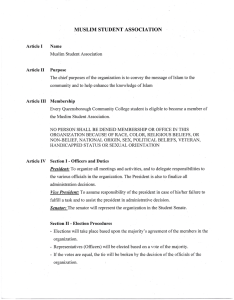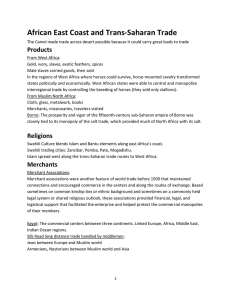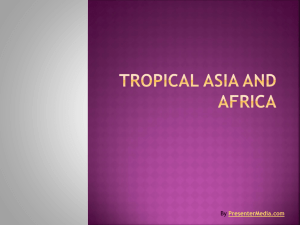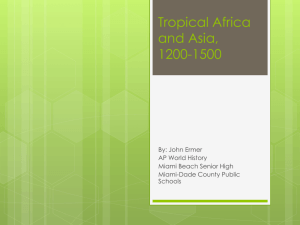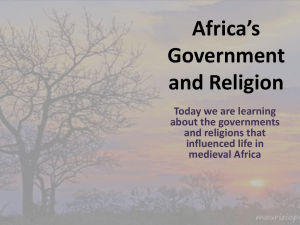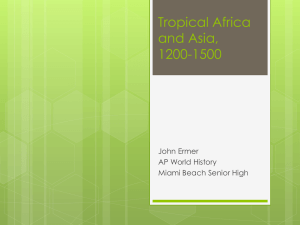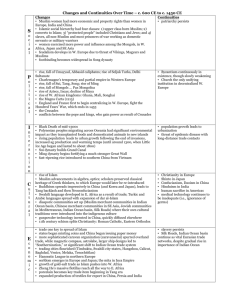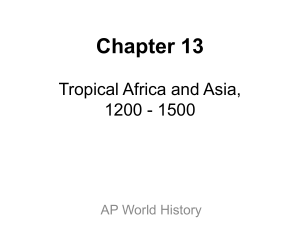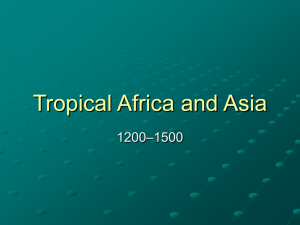Tropical Africa & Asia Study Guide: 1200-1500
advertisement
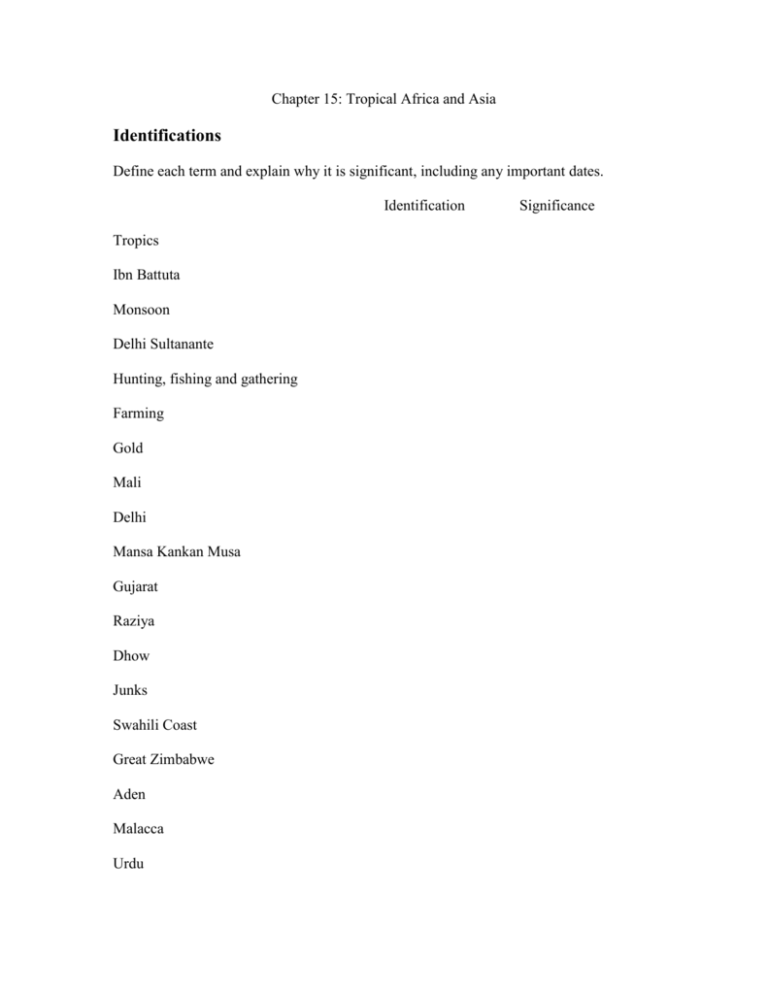
Chapter 15: Tropical Africa and Asia Identifications Define each term and explain why it is significant, including any important dates. Identification Tropics Ibn Battuta Monsoon Delhi Sultanante Hunting, fishing and gathering Farming Gold Mali Delhi Mansa Kankan Musa Gujarat Raziya Dhow Junks Swahili Coast Great Zimbabwe Aden Malacca Urdu Significance Timbuktu Slaves Multiple-Choice Questions Read the entire question, including all the possible answers. Then choose the one answer that best fits the question. 1. Which of the following did not link the peoples of Africa and Southern Asia? a. Islam b. Language c. Trade d. Environment 2. The dominant way of life for most tropical peoples between 1200 and 1500 was a. Food gathering b. Animal husbandry c. Farming d. Trade and economics 3. As farming spread in tropical Africa and Asia, it a. Did not always cause permanent changes in the environment b. Always damaged the environment c. Always replaced native species with introduced species d. Created monocultures 4. Why did the Chinese send a fleet to the Strait of Malacca in 1407? a. To take control of the region from the Kingdom of Siam b. To take control of the region from the Java-based kingdom of Majapahit c. To arrest a band of Chinese pirates who controlled the city of Palembang d. To establish a Chinese outpost there to dominate trade in the regions 5. Why did India have to import gold for jewelry and temple decoration from 1200 to 1500? a. It had no gold of its own b. It had exhausted its own gold resources c. So many temples were built that gold mining in India could not keep up with the pace d. It had trade agreements with Africa and Southeast Asia that required these imports in order to correct a trade imbalance 6. The role of force in spreading Islam south of the Sahara was a. Limited b. Considerable c. Encouraged by the Quran d. Encouraged by the ulama 7. Which of the following was not a factor in the decline of the Delhi Sultanate? a. Rivalries within the Muslim elite b. The discontent of the Hindus c. Revived Mongol interests d. Lack of trade 8. How did the collapse of the Mongol Empire in the fourteenth century affect trade? a. The overland trade route grew in importance b. The Indian Ocean trade route grew in importance c. All trade between western and eastern Eurasia stopped d. The collapse of the Mongol Empire did not affect Eurasian trade 9. The trade on the Indian Ocean was a. Competitive and divisive b. Rune by imperial decree c. Decentralized and cooperative d. Never very important to the economy of the area 10. Which of the following is not true about the trading center of Aden? a. It was the crossroads for the overland trade route between western and eastern Eurasia b. It had plenty of drinking water because of the monsoonal rains c. It was a convenient stopover for trade with India, the Persian Gulf, East Africa, and Egypt d. It acted as a warehouse for merchants to sort through goods from one place and then send them to another 11. Which of the following words is not Arabic in origins? a. Sahara b. Sudan c. Silk d. Swahili 12. Which of the following groups was most instrumental in the spread of Islam? a. Soldiers b. Monarch c. Merchants d. Peasants 13. Which of the following was least responsible for the spread of Islam? a. Imperial decree b. Marriage c. Upheavals that helped to wipe out competing religions d. Muslim domination of trade and markets 14. The rising prosperity of the elites resulted in a. Peace b. An increase in slavery c. A decrease in religious fervor d. Inflation 15. Why, according to historians, has the art of brewing received more attention than other ‘female’ arts, such as culinary skills? a. Brewing was also a way to make extra money b. Brewing takes more skill than cooking c. Men tended to be the principal consumers of beer d. Muslims are not allowed to consume alcohol, so its consumption was a sin 16. Which of the following is not characteristic of a dhow? a. Lateen sails b. Mounted cannon c. Sewn hull d. A rudder Short-Answer Questions Answer each question in one short paragraph, giving the definition, dates and significance. 1. Compare and contrast the complex irrigation systems constructed by powerful governments with those built by local peoples. Asses the advantages and disadvantages of each. 2. Why did the Hindus resent Muslims in India? 3. What brought prosperity to Great Zimbabwe? What brought decline? 4. Trace the rise of Malacca. What geographic and political factors contributed to it? 5. What affected the status of women in Muslim society? 6. Discuss the adoption and adaptation of Muslim practices by non-Muslim and newly Muslim societies?

